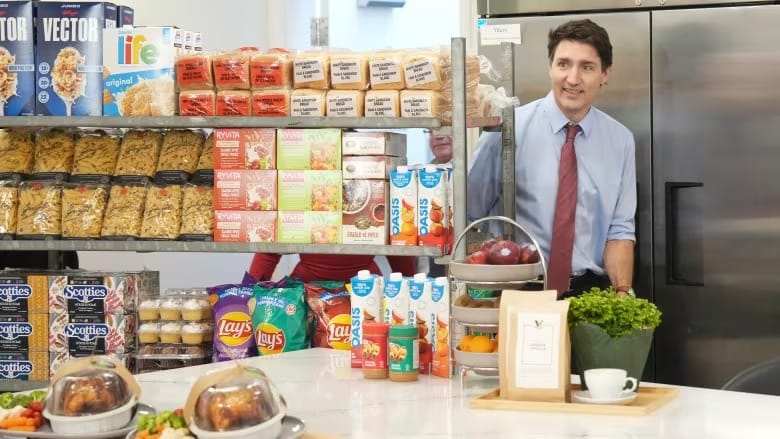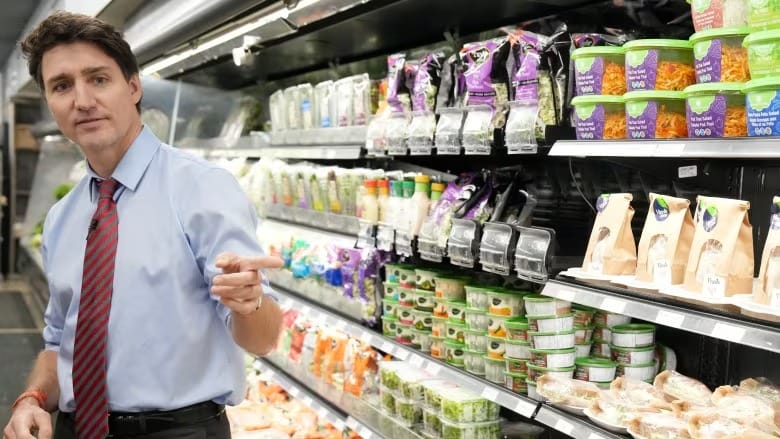Senators amend Bloc Québécois supply management bill, putting it on path back to Commons
Blanchet accuses senators of stabbing Canadians in the back, calls for original bill to be restored

On Wednesday, senators on the foreign affairs committee made changes to a controversial agricultural trade bill, sending it back to the House of Commons for further review.
The private member's bill, introduced by Bloc Québécois MP Luc Thériault, C-282, seeks to prevent Canadian trade negotiators from making future concessions that would open protected dairy, egg, and poultry markets. With growing tensions from American dairy farmers, the bill aims to shield Canada's agricultural industry from further financial losses. However, with U.S. President-elect Trump returning to the White House, standing firm on these protections could risk triggering a trade conflict with potentially broader economic consequences.
"This bill is about trade policy, not supply management," said Sen. Peter Harder, who introduced the amendment. "I believe we need to de-risk this bill."
Thériault and Bloc agriculture critic Yves Perron responded to the amendment by accusing senators of undermining the bill. They argued that committee members were clearly biased and aimed to kill the bill rather than improve it. The amendment, they said, nullified the bill's core purpose, which they found unacceptable, particularly in light of the results of this week's U.S. election, which they believed jeopardized Quebec's agricultural model.
Bloc Leader Yves-François Blanchet sharply criticized the senators, accusing them of betraying their own population by prioritizing other countries' interests. "They should be focused on protecting fair prices, quality, and safety for domestic consumers," Blanchet told reporters. "I am confident the amendment will be defeated, and the original version of the bill will be passed by the Senate."
While it is rare, the Senate can reject reports from its committees. International Trade Minister Mary Ng expressed that the government had only just seen the amendment but stands by the bill that passed in the Commons. The government remains committed to protecting supply-managed sectors, while Foreign Affairs Minister Melanie Joly said the government would review the amendment before taking a stance.
Over the past decade, Canada's market access concessions played a key role in securing major trade deals, including those with the European Union and Pacific Rim partners, and were a crucial part of efforts to appease Trump during the 2018 renegotiation of NAFTA.
Harder’s amendment weakens C-282 by excluding existing trade agreements, like the revised NAFTA, or any negotiations already underway, such as the ongoing talks with the United Kingdom. The amendment passed in the committee by a vote of 10-3. Marc Gold, the Liberal government’s representative in the Senate, opposed it, in line with Minister Ng's recent call for quick passage of the bill.
The committee added an "observation" to the bill when it returns to the full Senate, clarifying that the committee’s stance should not be interpreted as opposition to supply management. "The committee has focused its decisions on the bill’s impact on Canada’s trade relationships," the observation noted.
While C-282 passed the House of Commons with broad support, its path forward is uncertain, especially in the Senate, where non-government bills often face delays. The Bloc Québécois had earlier made the bill’s passage a condition for their continued support of the Liberals, but that deadline passed without progress, leading to the Bloc’s decision to work toward defeating Trudeau’s government.
If the Senate accepts the committee's report and amends C-282, the bill will return to the House of Commons. However, the House has been stalled by a filibuster, blocking progress on government business. Even if the filibuster ends, it’s unclear if the bill will take priority over other Liberal policies before the fixed federal election date next fall.
The Senate’s review of C-282 began before Trump’s return to the White House, but the potential for escalating trade tensions may now add urgency to the matter. Experts warn that passing the bill could provoke significant concern in Washington, with potential consequences for U.S.-Canada relations.
John Dickerman, vice-president for U.S. policy at the Business Council of Canada, suggested that if the bill passes, it would draw immediate attention from U.S. policymakers. "Concern is probably too conservative a word," he said. "It could become an emergency for the U.S.-Canada relationship."
Carlo Dade, director for trade at the Canada West Foundation, echoed these concerns, describing the bill as a "red flag" that would unnecessarily provoke U.S. ire. He noted that the U.S. is already frustrated with Canada’s handling of tariff-free dairy quotas under CUSMA, perceiving it as a violation of trade promises.
Similar disputes are unfolding with New Zealand over Canada’s compliance with the Comprehensive and Progressive Trans-Pacific Partnership (CPTPP), which opened Canadian dairy markets to Pacific Rim nations. Dade cautioned that other countries could align with the U.S. in demanding action on Canada’s dairy protections.
Inu Manak, a trade expert with the Council on Foreign Relations, pointed out that current trade disputes under CUSMA show that the system is not working for everyone. "The Trump administration sees everything as transactional," she said, warning that pressure from the U.S. could mount, especially as the 2026 CUSMA review approaches. "U.S.-Canada relations on trade are quite tense," Manak added, "and neither side is willing to compromise."





